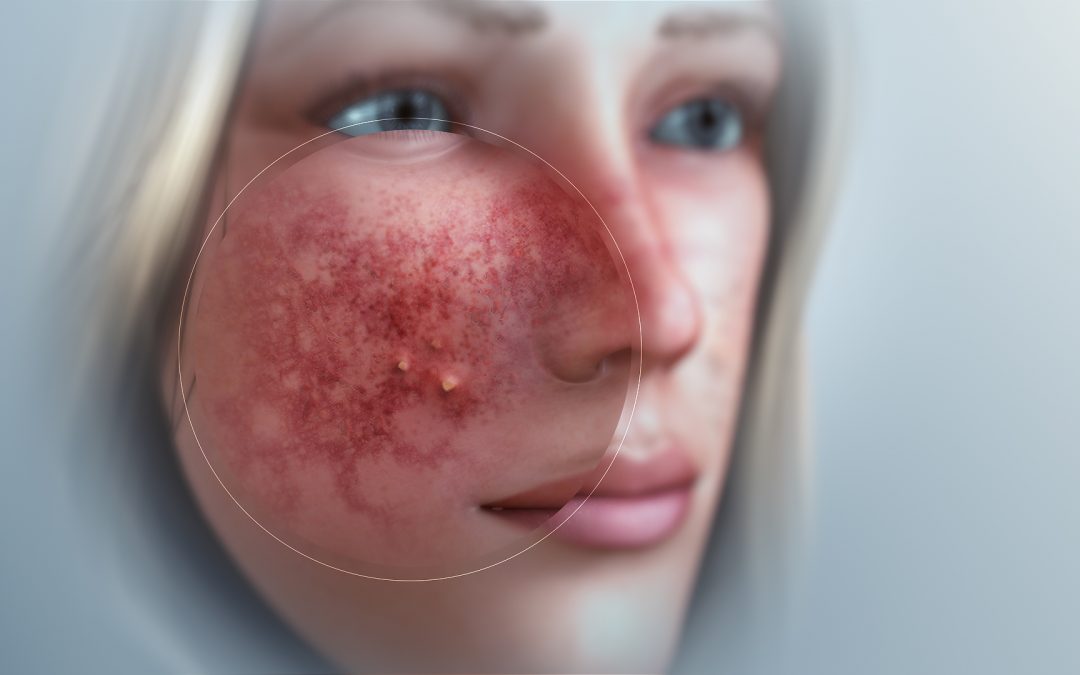April is designated as Rosacea Awareness Month by the National Rosacea Society (NRS). The aim is to raise awareness and education on the impact of this widespread skin condition. Did you know, Rosacea affects 1 in 10 people in the UK and is most common in the middle aged population?
What is Rosacea?
Rosacea is a common long term skin condition affecting the face, causing redness across the nose and cheeks. It is far more than just flushed skin or a “healthy outdoor glow”. Rosacea can almost look like excessive sunburn and feels hot, sore and uncomfortable. Symptoms of Rosacea can vary considerably, some people experience recurrent blushing to permanent red skin to small bumps across the surface of the skin, the blood vessels may be visible with veins broken, others may experience acne-like eruptions of pustules and lumps. The exact cause of Rosacea is not known. It is thought to be hereditary or influenced by the environment we live in.
Who can be effected by Rosacea?
Unfortunately for my female readers and clients, Rosacea often effects women and often develops between the ages of 30-50 and more common in fairer skins. Although less common, men can also suffer with this condition when they do, often experience more severe symptoms. Rhinophyma affects the nose, where the skin becomes thickened and deep purple/red in colour. This can make the nose appear larger, often looking deformed. The skin on the cheeks, forehead and chin becoming thickened.
Can Rosacea be cured?
Rosacea cannot be cured, but with several in clinic treatment and the correct prescribed homecare symptoms can be dramatically reduced. It is important to keep the skin hydrated and comfortable as this alone can begin to reduce redness and make the skin feel less irritated. For some extreme cases of Rosacea some doctors can prescribe creams to reduce an infection or irritation.
When caring for Rosacea skin DO:
- Moisturise the skin every morning and night with a gentle moisturiser ensuring the skin stays hydrated.
- Make sure you wear an antioxidant sunscreen every day. Try using one containing Titanium Dioxide, as this is a physical protectant, it’s less likely to cause and allergic reaction.
- Make a note of when your skin feels most sensitive and try to find a link. Is it after using certain products, consuming certain foods or drinks or during particular seasons?
Dont:
- Try to avoid going from extreme cold to extreme heat, try to let your skin acclimatise.
- Avoid really hot baths and showers.
- Avoid rubbing dry after washing, pat dry instead.
- Don’t assume hypoallergenic products will work to reduce sensitivity. While the meaning of hypoallergenic is “a product less likely to cause irritation”, the manufacturer doesn’t actually have to submit this claim to the FDA for product approval. This is why it is important to consult with your skin professional.
Treatment Options
Rosacea and skin sensitivity is not always considered a medical condition and it can be very frustrating. With time and effort it is possible to lessen symptoms and in some cases eradicate the problem. By combining ‘good house keeping’ you can lessen the symptoms, keeping the skin nourished, hydrated and avoiding certain triggers. Combine this with a specifically prescribed home care routine and a course of in clinic treatments, you can improve the skin’s cosmetic appearance and simultaneously stimulate collagen and elastin to promote healthy skin growth. For more information on products and treatment to ease your Rosacea skin concerns you can call me on 07968235402.

